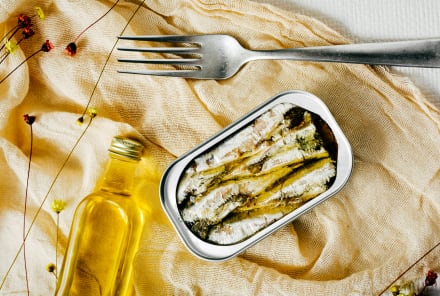Advertisement
What's The Best Diet For Women Over 40? This Doctor Thinks Keto


"I've just been so tired but I can't sleep," my 44-year-old patient Brenda complained during our first consultation. "I'm forgetful and have no patience. I don't feel like I even know myself. To add to that mess, I don't even desire sex with my husband anymore. I'm OK once we get started but then..."
Brenda stated exactly what so many women have struggled with in the past, including me. As a doctor of gynecology, I frequently get 40-something women in my office working through self-sabotaging menopausal issues including hot flashes, low energy, near-zero libido, weight gain, and weight loss resistance. Hormonal imbalances contribute1 to many of these problems. When hormones like estrogen, testosterone, and dehydroepiandrosterone (DHEA) nose dive, you’ve got the perfect storm for menopausal miseries. But it doesn’t have to be this way.
You have more control than you think.
Studies show that how you eat and live contribute significantly2 to how you transition through menopause. And while Brenda vigilantly monitored her caloric intake, she was eating too much dairy and other inflammatory foods that created hormonal imbalances in addition to living an action-packed lifestyle with few outlets for stress reduction. Meanwhile, her regular, intense cardio workouts spiked Brenda’s fat-storing hormone insulin and stressed out3 her (already overworked) adrenal glands.
Understandably, she felt frustrated. After all, she felt starved and worked out like a fiend yet she couldn’t lose weight and frequently felt tired, unsexy, and miserable. As a holistic health expert and doctor of gynecology, I’ve found the perfect lifestyle plan for menopause and its complications.
Over 40? You should consider a ketogenic diet.
For Brenda (and many of my patients), this high-fat, low-carbohydrate diet helped reset her insulin, estrogen, and other hormones. She lost weight, felt better, dialed down her hot flashes, and on her third visit seemed thrilled that finally she was back in the mood again. Especially for menopausal patients, I’ve found these strategies help optimally transition into this effective diet:
Nix these culprits.
Please don’t shoot the messenger, but caffeine, chocolate, and alcohol (yes, even red wine) may create or exacerbate adrenal stress, hot flashes, and other menopausal complications. Especially during the first few weeks, I ask patients to eliminate these beloved foods and drinks. I promise it’s only temporary!
Stop fearing fat.
"How can I eat this much satisfying food and still lose weight?" Brenda asked during our second meeting. For fat-phobic patients (especially those who lived through the low-fat brainwashing in the '80s), ketogenic diets—which are about 80 to 90 percent fat—can initially seem4 unbelievably decadent. Yes, that’s a lot of fat, but you’ll focus on filling, healthy sources like avocado, wild-caught fish, nuts, and seeds. Yay for foods that we love!
Pay attention to food intolerances.
Gluten, dairy, and other food intolerances adversely affect5 your gut microbiome and pave the way for leaky gut, chronic inflammation, and potential autoimmune disorders. In other words, they can ramp up your already miserable menopausal symptoms. When patients like Brenda pull them from their diets for at least three weeks, they feel better and lose weight easier.
Find ways to de-stress.
Chronic stress and anxiety contribute to hot flashes, increase sugar cravings, and raise inflammation, setting the stage for (yikes!) more hot flashes. Brenda found yin yoga worked best to lower stress. You might find meditation, deep breathing, or walking your dog are the best options for you. So find your bliss and do it regularly!
HIIT and resist.
Brenda swapped out cardio for weight resistance and high-intensity interval training. Studies show6 HIIT helps you lose weight, lower blood pressure, and reduce oxidative stress (all big problems during menopause). Another study7 found menopausal women who combined a ketogenic diet with resistance training became leaner than those who didn’t.
Up your sleep.
Poor sleep becomes a common problem in menopause and can jeopardize weight loss and overall health. Studies show8 that lowering hot flashes, one of the benefits of the ketogenic diet, can help you sleep better. Brenda could finally get eight hours of high-quality, uninterrupted sleep, leaving her feeling fabulous. Adding a bioidentical progesterone cream at night can really help with sleep, too.
Dial down inflammation.
Along with foods like wild-caught fish, Brenda found a green powder with ingredients like maca, turmeric, and other nutrients helped control her inflammation9 and maintain alkaline balance. She also sprinkled turmeric, which is rich in anti-inflammatory curcumin, on her food.
The views expressed in this article represent one expert’s take on this topic and may not be representative of mindbodygreen's perspective. The information here is not a substitute for professional medical advice.
9 Sources
- https://www.ncbi.nlm.nih.gov/pmc/articles/PMC2716748/
- https://www.ncbi.nlm.nih.gov/pubmed/26327890
- https://www.ncbi.nlm.nih.gov/pmc/articles/PMC1325029/
- https://www.ncbi.nlm.nih.gov/books/NBK209323/
- https://www.ncbi.nlm.nih.gov/pmc/articles/PMC4259177/
- https://www.ncbi.nlm.nih.gov/pubmed/26285177
- https://www.ncbi.nlm.nih.gov/pmc/articles/PMC2845587/
- https://www.ncbi.nlm.nih.gov/pubmed/17486023
- https://www.ncbi.nlm.nih.gov/pubmed/19594223


















